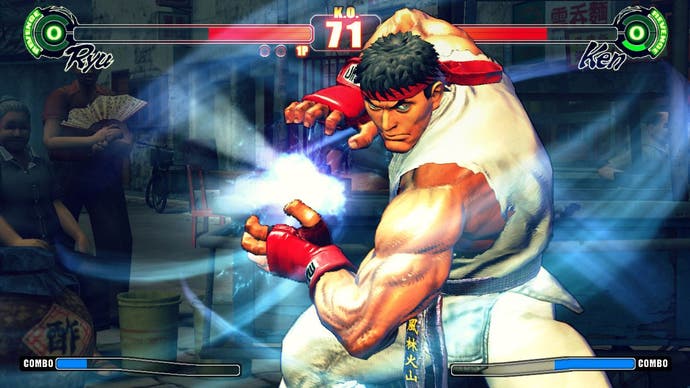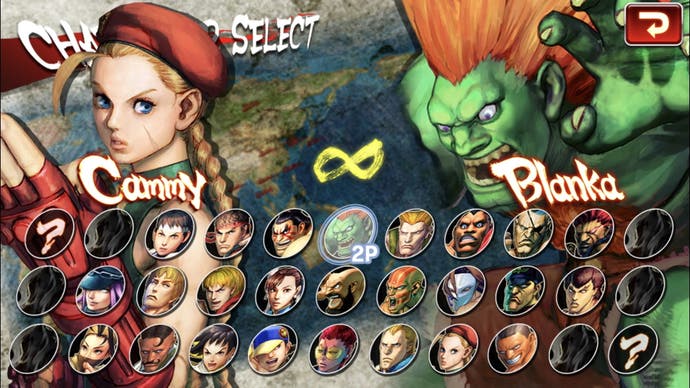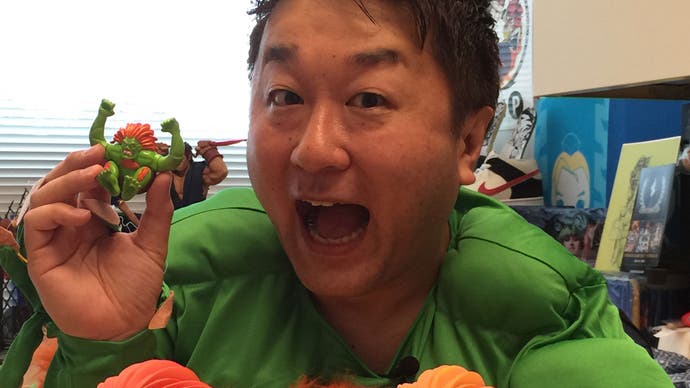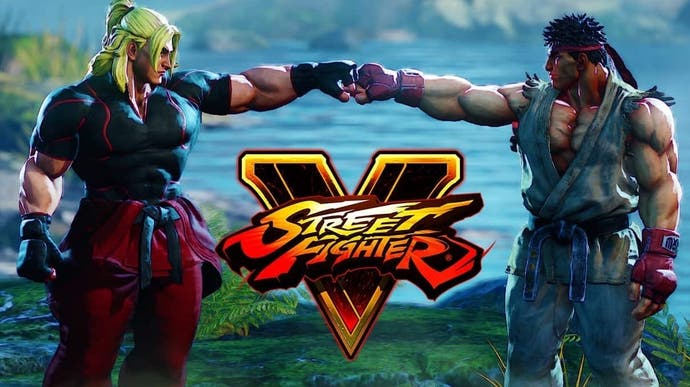What does the future hold for Street Fighter 5?
Yoshi Ono on Deep Down, how Stadia won't work for Street Fighter and more.
For years now, Yoshinori Ono has been the public face of Street Fighter. And Street Fighter's defined his life - having fallen in love with Final Fight, Ono made a beeline for Capcom and found himself working there soon after Street Fighter 2's release and through the series' glory years. He became a household name, though, for helping bring Street Fighter back from the wilderness.
"This was before social media, before the internet, before Facebook," Ono told me during an on-stage interview at last month's EGX. "It wasn't until I was working on Onimusha that I could see what a phenomenon it had become. I was going around with Inafune, but people would always be asking me about Street Fighter. So I went back to Capcom and said the world was ready for more Street Fighter." Bringing back Street Fighter wouldn't be simple, though. "It was tough. As a company, Capcom were past making fighting games in general. It was 99.99 per cent decided that fighting games were done and dusted and we were moving on to other things. But I managed to convince [Keiji] Inafune and the then-chairman - they were like, okay we'll give it a shot. That's all it took for me to flip those percentages. If it hadn't gone as well as it did, I might have been fired... I'm glad Street Fighter 4 did as well as it did."
The series has flourished ever since - even if it hasn't been without its struggles. Street Fighter 5 saw through a rough launch period and is now an assured fighter with one of the strongest communities around it - at EGX, the Capcom Pro Tour stage was one of the most vibrant, well-attended of the whole show. And next year it's becoming part of the Intel World Open, a tournament that welcomes all-comers through its early online rounds before the grand finals take place alongside next year's Olympics in Tokyo, with a $250,000 prize pot up for grabs.
The big online tournament is being enabled by some big updates coming to Street Fighter 5 later this year, and the day after our on-stage chat at EGX I met up with Ono in Capcom's Hammersmith offices to talk about where the series is at, and where it's heading in the future.
In terms of the big updates that have been teased to be coming later this year - well, none of it's leaked so far.
Yoshinori Ono: I can't really go into details - the main thrust will be this additional mode. At the moment we have group tournament - it's about eight people that can be invited to a lobby. This new mode will blow that out of the water in terms of scale. We're still working out details in the beta, but it'll certainly be dozens, hundreds of people that can take part in a tournament at the same time. We're fine-tuning that and that'll be ready in the coming months.
Is this part of a big refresh for Street Fighter 5?
Yoshinori Ono: Not so much, it's just the addition of this new feature. Maybe when I say big update, you're imagining the old days of Super and Ultra. I think it's a big addition to the game, but as you've seen, the strategy for the title has been gradually adding more features, more characters and it's gradually gotten bigger over time.
One slightly different approach for the Intel World Open - in the past when the Capcom tour was running, we'd have the freedom to add a character while people are practicing, or make a change or adjustment to the balancing. We want to create a level playing field, as it's such a large audience - anyone can take part. As I've mentioned recently, there are some things coming in November and December. Once that's out, we're going to lock the game down for a while, so people aren't being caught out by balance changes when the qualifiers open up around February/March time. We're getting some big updates out the way for the end of the year, and then we're going to say this is Street Fighter 5 as it exists now and then let it run in its current form until the tournament is over.
Just generally about Street Fighter 5 - what's your assessment of where it is right now?
Yoshinori Ono: We've worked hard on the game over the years. It's come through a tricky launch, where we had all kinds of comments coming from fans and the media - such as Eurogamer. But I think we've got to a good place now. Things have calmed down in the best sense of that word. When you've got a form of entertainment like this, we're providing a rulebook to create your own entertainment. Those rules need to be well established, and people need to be able to understand them and get onboard with them. I think everyone is at the moment, and all the additions we've made have brought it to a good place. We're still working on it, and we still have around half a million matches a day. That's something that provides us with a massive amount of data - we can view the inputs and outputs of all these matches and use it as research when it comes to which characters need nerfs, which need buffs. That's something we're going to be doing on an ongoing basis.

One of the big issues we're having is that there are so many matches taking place, and so much replay data, that every month backing up the server - this sounds banal - it's taking so much time and money to get them backed up to AWS and Google servers. That's something I want to try and get better at in the future. So maybe if this IWO thing goes well I can go to Intel and say please give us some server space for all our backups.
The fanbase seems really healthy - you walk past the Capcom Pro Tour at EGX and it feels like one of the most vibrant, well-attended parts of the show. But it does feel like Street Fighter's lost its place as the premier fighting game, in the mainstream space, because of Mortal Kombat 11. Is that something you're aware of, and want to rectify?
Yoshinori Ono: This comes up regularly every few years, when a new title makes a big splash in fighting game fandom. Two or three years ago I was sitting down with journalists saying Dragon Ball is massive, what are you going to do about that? Well, you're not asking me about Dragon Ball now, are you? Now Mortal Kombat 11 is big, and that's great. I think people that play games, particularly on console, will always have their eye on various titles, they don't just play one thing. Even in the same genre - they'll get onboard with new titles then move on to the next one. Street Fighter has a longer legacy and history than a lot of games - and building on our 30 years of history, building on 5 and then on to 6 and 7, we're going to be creating more legacy and more history. I don't think we need to stop every time a new title becomes popular and pivot around that - if we did that we'd be changing direction every few years and we need to keep our eye on the future of our own franchise, and keep going in that direction.
Ed Boon did say he wanted to get a Street Fighter character in Mortal Kombat but wasn't allowed. Was it you who denied it?
Yoshinori Ono: It's true that a proposal for a Street Fighter character in Mortal Kombat was rejected by Capcom. But it wasn't me personally! There were many people at the company that felt that it wasn't a good fit for our characters. I actually met Ed at the Brazil game show and spoke to him personally about it. So it's true - but I didn't make the decision!
Is it just the fact the two worlds don't mix?
Yoshinori Ono: That was the major concern of our licensing.
Mortal Kombat has lots of guest characters from various different universes. Is that something you might consider for Street Fighter?
Yoshinori Ono: We don't necessarily rule anything out. We've had our share of crossovers over the years - Marvel vs. Capcom, Tatsunoko vs. Capcom. From Ed Boon's side they had Injustice that had various universes colliding. It didn't work out this time, but Capcom is interested in doing that kind of thing. If we can get something we feel good about, we could move quite quickly to make that happen.

And Capcom said it's quite keen to bring back old IP. Maybe that's one avenue of doing it as well.
Yoshinori Ono: As I mentioned when we had our chat yesterday, there's a lot of IP at Capcom. I'm interested in bringing this and that back - but the company's got so big, sometimes it's difficult to get these things off the ground. I'm going to have to work that out by myself.
All this is a roundabout way of me asking you to put more Rival Schools characters in Street Fighter.
Yoshinori Ono: I didn't get anything during yesterday's talk, but I'll bring my collection box around again so you can contribute.
How did it go with storming the Nintendo stand? [When asked at EGX about getting Street Fighter 4 and 5 on Switch, Ono told fans to go to the Nintendo booth and ask them.]
Yoshinori Ono: I haven't heard anything... I can only assume it didn't happen.
In terms of the future of Street Fighter - is that something you've got your eyes on? There's a new generation coming next year. How's Street Fighter going to fit into that?
Yoshinori Ono: I've seen the Wired PS5 article and was looking at it in amazement. I think for something like Street Fighter, though, the best thing is not to rush out with something at launch of a next generation console, but let the next generation start, let the install base increase, see the capabilities in the wild, and then take a look at how we approach our game design from the bottom up on that new platform. At the moment I think with things like the Intel World Open next year we've got plenty of things to keep us busy, and we want to keep up our stewardship of the current versions of the title, and make sure they're running fine and have these opportunities. When the time's right we'll look at next gen possibilities, but no sooner than that.
You spoke briefly about streaming platforms, which is a large part of the future, and how you're of the belief that [fighting games] aren't possible on the current tech. Have you had experience of Stadia, and is a fighting game something you think wouldn't work on that platform?
Yoshinori Ono: I tried it out at Google's offices - of course, I'm assuming they have amazing internet at Google. I felt that for an action game, if you're not super hardcore and into frame-counting it could work, the average gamer - [at this point Ono says it's for people who shop at Marks and Spencer, though I think he has a different opinion of Marks and Spencers' shoppers to me]. I think it'll be fine for them. But if you're more demanding, you're probably already complaining to me about the netcode, and all we're doing is sending commands. The idea of using current infrastructure to send those inputs and all the visuals seems like a tough ask at the moment. I think there's going to be some breakthrough - hopefully we'll see some great inspirational idea for how to really get this stuff working. It's like the egg of Columbus - everyone was trying to figure out how to balance it on its end, they were trying different ways to prop it up and he just took the egg and hit its bottom to make it stand. I don't know what the moral of the story is. The egg was broken. There needs to be some breakthrough, then we'll see how it works out. For the time being it's not there just yet.
Street Fighter 5 had a troubled launch. If you were launching a new one now, what would you do differently?
Yoshinori Ono: We definitely learnt a lot from launch, the main thing being our netcode - we took a lot of heat for the quality of that. It's easy to look back now and say we got through it, but it was a tough period. We had to do a lot of work to improve that and get it to where it is today. That's one thing I'd definitely look at for any future title, that has to be got right at launch. There's also going to be new technology when we release any future title that we have to use cleverly - things like, we mentioned Intel working in 5G and AI. There's the obvious way to use these things - 5G will make the network faster - but will AI improvements let you do cleverer AI on computer opponents? There also could - going back to the Columbus thing - be a different, cleverer way of doing things that isn't obvious. We need to look at what technology is available when we release new titles so we can push them forward and not just say it's faster now.
Have you considered what those possibilities might be?
Yoshinori Ono: I think with AI, for example, the most obvious way to use it would be smarter computer AI. Smarter means more difficult, right, they can read your moves and beat you more easily. I'd like to flip that and have them smarter at teaching you how to play the game - so instead of being a tougher opponent, they're a better, tougher teacher who will help you learn how to play the game and improve your own playstyle.
For example, taking someone like Problem X - he's a really great M.Bison player. How come whenever he uses that character he's much better than me? What's he doing differently, and what can I do to be more like him? So taking data from a match where Problem X is playing, and a clever AI engine could analyse what he's doing and help you learn what he's doing, this is where he's moving faster than you, this is the move he did that you didn't do. It's not going to automatically make you as good as a pro, but it'll show you the things you need to improve and focus on.

That sounds fascinating. I wanted to move on to your role at Capcom, as I know it changed recently. So what is your role currently at Capcom - are you still in charge of Street Fighter?
Yoshinori Ono: I think Japanese companies restructure a lot. My role as Street Fighter guy hasn't changed in decades, though. My salary hasn't really changed either...
So you're still Mr. Street Fighter and are still stewarding the series?
Yoshinori Ono: Yup, that's what they call me and that's what they still do.
There was a period where I thought you were going to be Mr. Deep Down. What happened with all that?
Yoshinori Ono: I haven't been called Mr. Deep Down quite yet. The original team is clearly no longer together at this point, but people might have noticed that we've kept the trademark registered, and it's not been completely given up on. Every year we examine titles we're doing in future, and we bring up projects to approve and move forward. There's not much I can say about it, but if you've noticed we've kept the trademark it means we haven't given up on the title completely.
I played it at TGS a few years ago and it looked really promising.
Yoshinori Ono: We did have the concept developed a bit further than that, but yeah...
Are you always going to be Mr. Street Fighter now? Is that your life's work?
Yoshinori Ono: I mentioned to you yesterday, but ever since playing games like Final Fight and Street Fighter before I joined and thinking not only wouldn't it be cool to girls if I worked at a game company, but wouldn't it be great to do this kind of thing you have a passion for and have it put food on the table too. I've stuck with Street Fighter ever since, through the highs and lows, the golden age of the 1990s and then when the series was off the radar, the comeback with Street Fighter 4. As long as they'll let me stay and don't push me out the company, I'll always be Mr. Street Fighter.
I think it's fair to say it's my destiny at this point. Whenever I go through customs the customs officers will gather around and take selfies. I even went to Disneyland Paris with my family, Mickey Mouse was right there but people were stopping to take selfies with me. I guess you can't complain about becoming a beloved brand.
As you've alluded to, a lot of it's been good, there's been some that's less good. Is it still something you have that passion for?
Yoshinori Ono: If you didn't have that kind of passion, you wouldn't be able to have the schedule I do. I've only seen my family four days out of the past two months. I'm going home today though! Between all the announcements and different events, it's tough. But knowing that my family understands that this is what I have to do, and knowing that the community has a lot of love and passion for the game and the brand is what helps me keep going. I've got really good at washing my clothes in hotel rooms.
You do seem to butt up against Capcom a fair amount. Has it become easier to convince Capcom to make the Street Fighter you want to make?
Yoshinori Ono: The resistance to bringing back Street Fighter 4 - I threw out this 99.99 per cent number and it got picked up by fan sites - I don't want to give the impression it's stubborn resistance to me doing what I want to do. The fact was that I think people at the company at that time didn't think there was a market for a game like this anymore. What I had in mind was bringing Street Fighter back in a certain way, it'd be a hit. I think people thought that because I loved Street Fighter so much I just had blinkers on.
But once we brought it back, and it really did as well as it did, people who had resisted, they realised that I'd seen a market and demand for this kind of game. I don't want to give the impression that nothing I say is ever taken seriously! It's more like at that time, in that situation for the industry and Capcom and Street Fighter, there were a lot of reasons to think that Street Fighter couldn't make a comeback - but that's a problem we solved.


